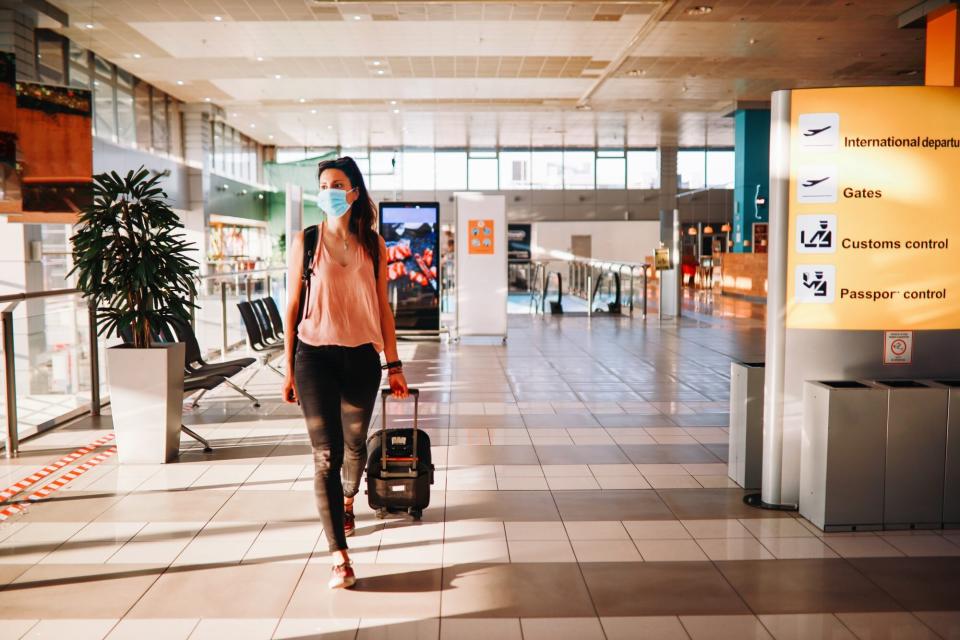You've Been Vaccinated—Now, Follow This Expert Advice on Your Next Flight
After a year of homebound "staycations," most people are itching to get out of their bubble and travel, but it's understandable that we all still want to feel safe doing so. The good news is we are steps closer to that dream now that coronavirus vaccinations are widely available in the U.S. With summer travel plans starting to form, here's what experts think you should know about airport travel once you're fully vaccinated.
Related: These Top-Rated Clear Face Masks Allow Others to Read Your Lips While Staying Safe

lechatnoir / Getty Images
Wait two full weeks post-vaccination before traveling.
"Vaccines provide a level of confidence that if you get exposed to COVID-19, it is unlikely that you would become severely ill and [decreases] the likelihood of getting COVID-19 infection, but does not completely remove it," says Kelly Cawcutt, M.D., associate medical director of infection control and epidemiology at the University of Nebraska Medical Center (UNMC). That's why it's best practice to get the vaccine before you travel, to lessen the risk of transmission.
According to the Centers for Disease Control (CDC), people are considered fully vaccinated two weeks after receiving a second shot of a two-dose shot like Moderna and Pfizer, or a one-dose shot like Johnson & Johnson. Once fully vaccinated, the CDC says a small group can safely gather indoors with vaccinated or unvaccinated people, without the need for masks and social distancing, unless someone in the group is immunocompromised or at increased risk. So, you should wait a full two-weeks post vaccination to ensure the best protection for yourself and others. "[Because] you still could bring the virus home to those who may not be vaccinated yet (such as children, which are rising in case numbers now), or to others at your destination. In this setting, proximity does still matter to risk of exposing yourself or others to COVID-19," says Dr. Cawcutt.
Continue to wear a mask indoors in public spaces and social distance when possible.
Though vaccination rates are rising—an estimated 35.4 percent of eligible Americans, or 115 million people age 18 and up, have been fully vaccinated at the time of publication—there are still many who are cautious or unwilling to get the vaccine. That means while traveling, you will be among vaccinated and unvaccinated populations. "Given that there is still risk of asymptomatic carriage both for acquisition of infection and vaccinated persons carrying the virus to others, I would still recommend continued mask use, hand hygiene, and if masks are removed, to do so away from others not in your household and for as short of period of time as possible," Dr. Cawcutt advises. Generally, these masking and distancing guidelines are still required inside public spaces, like airports, planes, trains, and buses, but you won't need to get tested or quarantine before or after domestic travel.
Don't be too stressed about airplane transmission.
Airplanes were not the primary sites of coronavirus transmission even during the height of the pandemic so there is little risk of contracting the virus from a plane once vaccinated, observes Amesh Adalja, M.D., a senior scholar at the Johns Hopkins University Center for Health Security. That's because most airlines have high-level ventilation systems that constantly cycle air, pulling fresh air in from the exterior, and pushing used air back out. You should, however, continue to wear a mask while onboard the aircraft to protect others.
Experts are still navigating the new variants of COVID-19.
While the vaccine is highly effective at fighting coronavirus, and significantly reduces risk of hospitalization and death, scientists are still learning about the new variants of COVID-19, such as the U.K. strain. Dr. Cawcutt explains that your safety level is higher with the vaccine than without it, but there have been cases of virus breakthroughs in those with immunocompromised systems. "Speaking with your physician about risk [of travel] is appropriate," says Dr. Cawcutt. She notes that, as a country, "we are still trying to curb the spread of this infection, so protecting others who may not yet be vaccinated is still critically important, especially given all the rising variants." When planning a trip, you can also track what locations are seeing higher cases of COVID-19 using this U.S. coronavirus map by Mayo Clinic.
Consider keeping a digital copy of your vaccine card on you.
As of now, the federal government is not requiring proof of vaccination (i.e. a "vaccine passport") to fly domestically, but when flying internationally, you may need to provide this, depending on your destination. "Having either the card or a copy/photo of it may be reasonable, but I would recommend assessing pre-travel requirements to determine if the actual card will need to be presented," says Dr. Cawcutt. Regardless of your vaccine status, you will have to show a negative test before flying into the U.S. for reentry.
"Please remember, especially if traveling internationally, that other travel infections also still exist. Call your doctor, or a travel clinic, to ensure you are up-to-date on all recommend travel vaccines and healthcare guidance," says Dr. Cawcutt. "And please remember, the vaccines provide the biggest benefit as we get more and more people vaccinated. Get your vaccine and please still follow guidance for mask use, social distancing, and hand hygiene per CDC recommendations while we continue to fight this pandemic and decrease local cases of infection."

